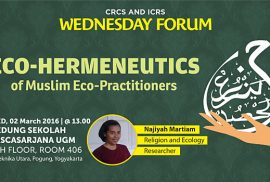
Abstract
Contemporary Muslim discourse on Islam and ecology displays a strong normative approach which deduces its views on Islam and environmental issues from the main textual sources of Islam. However, recent works on the ecological practices of Muslim individuals and communities are showing that such practices are not merely implementations of text-based norms; rather, they also engender new arguments and understandings. Putting attention only to normative debates tends to ignore the fact of pluralism within Islam and different ways of reading the Islamic texts, and the diversity of Muslim eco-practices as well. Following an examination of this discourse, this study focusses on how one Muslim eco-practitioner has developed, justified, and defend eco-friendly practices, and his ideas about Islam and ecology are lived through his practices. It shows that ecological practices not only apply normative texts, but also function in the formation of “Islamic views of nature” and “Islamic environmental ethics”. Finally this presentation also produces different narratives on Islam and ecology which need to be acknowledged and may prove more inspiring for advocacy than the apologetic ones.
Speaker
Najiyah Martiam earned her Bachelor’s degree in Agricultural Technology from Gadjah Mada University (UGM). After spending 4 years working on reproductive health issues, she came back to UGM to study for her Master’s degree in religious studies at the Center for Religious and Cross-cultural Studies (CRCS) where she currently works as public education staff. She is also researching Islam and ecology, and practising permaculture with her community. Her interests include religion and science, religion and ecology, Sufism and women’s spirituality, and music and spirituality.
Arsip:

